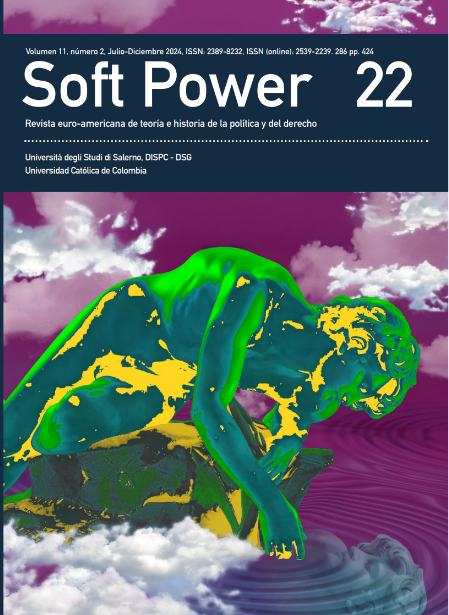
Este trabalho está licenciado sob uma licença Creative Commons Attribution-NonCommercial 4.0 International License.
Al enviar los artículos para su evaluación, los autores aceptan que transfieren los derechos de publicación a Soft Power. Revista Soft Power para su publicación en cualquier medio. Con el fin de aumentar su visibilidad, los documentos se envían a bases de datos y sistemas de indización, así mismo pueden ser consultados en la página web de la Revista.Resumo
The essay describes the possible effects on human political competence of a world populated by socially autonomous machines. Forgetfulness, trust, and conflict are the main topics addressed.

Referências
Acemoglu, D., & Restrepo, P. (2020). Robots and Jobs. Evidence from US Labor Markets. Journal of Political Economy, 128(6), 2188–2244. https://doi.org/10.1086/705716
Arkin, R. C. (2009). Governing Lethal Behavior in Autonomous Robots. CRC Press. https://doi.org/10.1201/9781420085952
Avent, R. (2018, January/February). How Robots Will Break Politics. Politico. https:// www.politico.com/magazine/story/2018/01/05/robots-politics-automation-technology-216220/
Aylett, R., & Vargas, P. A. (2022). Living with Robots. What Every Anxious Human Needs to Know. The MIT Press. https://doi.org/10.7551/mitpress/13487.001.0001
Ceola, P. (2020). Macchine Guerriere Autonome. Filosofia, LXV, 51–62. https://doi. org/10.13135/2704-8195/5078
Coeckelbergh, M. (2022). Robot Ethics. MIT Press. https://doi.org/10.7551/mitpress/ 14436.001.0001
Croce, B. (1938). La storia come pensiero e come azione. Bibliopolis.
Čapek, K. (1921). R.U.R. (Rossum’s Universal Robots). Penguin.
Denicolai, L. (1998). Mediantropi. Introduzione alla quotidianità dell’uomo tecnologico. FrancoAngeli.
Dumuchel, P., & Damiano, L. (2016). Living with Robots. Harvard University Press.
https://doi.org/10.4159/9780674982840
Ertel, W. (2019). Artificial Intelligence, the spare time rebound effect and how the ECG would avoid it. International Conference: Economy for the Common Good (ECGPW-2019), Bremen.
Faggin, F. (2023). Irriducibile. La coscienza, la vita, i computer e la nostra natura. Mondadori.
Floridi, L. (2014). The Fourth Revolution. How the Infosphere is Reshaping Human Reality. Oxford University Press.
Floridi, L. (2019). The Logic of Information. A Theory of Philosophy as Conceptual Design.Oxford University Press. https://doi.org/10.1093/oso/9780198833635.001.0001
Ford, M. (2016). The Rise of Robots. Technology and the Threat of Mass Unemployment.Oneworld Publications.
Gembillo, G. (1999). Neostoricismo Complesso. ESI.
Giddens, A. (1991). Modernity and Self-Identity. Self and Society in the Late Modern Age. Stanford University Press.
Hertog, S., Fukuda, S., Matsukura, R., Nagase N., & Lehdonvirta, V. (2023). The Futureof Unpaid Work: Estimating the Effects of Automation on Time Spent on Housework and Care Work in Japan and the UK. Technological Forecasting & Social Change, 191, 122443. https://doi.org/10.1016/j.techfore.2023.122443
Howe, B. R. (2023). The Robots We Were Afraid of Are Already Here. https://www.nytimes.com/2023/07/29/business/robots-workers future.html
Hume, D. (1739). A Treatise of Human Nature. Oxford University Press. https://doi.org/10.1093/oseo/instance.00046221
Karakilic, E. (2020). Why Do Humans Remain Central to the Knowledge Work in theAge of Robots? Marx’s Fragment on Machines and Beyond. Work, Employment and Society, 36(1), 179–189. https://doi.org/10.1177/09500170209589
Khodyakov, D. (2007). Trust as a process: A three-dimensional approach. Sociology,41(1), 115–132. https://doi.org/10.1177/0038038507072285
Locke, J. (1980). Second Treatise of Government (C. B. Macpherson, Ed.). Hacket.
Luhmann, N. (1968). Vertrauen. Ein Mechanismus der Riduktion sozialer Komplexität.Lucius & Lucius.
Marwala, T. (2023). Robotics in Politics. In Artificial Intelligence, Game Theory and
Mechanism Design in Politics (pp. 175–190). Palgrave Macmillan. https://doi.org/10.1007/978-981-99-5103-1_11
McCarthy, J., & Hayes, P. J. (1969). Some Philosophical Problems from the Standpoint of Artificial Intelligence. In B. Meltzer & D. Michie (Eds.), Machine Intelligence (Vol.4, pp. 463–502). Edinburgh University Press.
Moro, P. (2015). Libertà del robot? Sull’etica delle macchine intelligenti. In R. Brighi &S. Zullo (Eds.), Filosofia del diritto e nuove tecnologie. Prospettive di ricerca tra teoria e pratica. Atti del XXIV Congresso della Società Italiana di Filosofia del Diritto (pp.525–544). Aracne.
Mumford, L. (1970). The Myth of the Machine. Harcourt, Brace & World.
Nicolelis, M. (2018). The True Creator of Everything. How the Human Brain Shaped the Universe as We Know It. Yale University Press.
Perelman, Ch., & Olbrechts-Tyteca L. (2008). Traité de l’argumentation. La nouvelle rhétorique. Éditions de l’Université de Bruxelles.
Rawls, J. (1971). A Theory of Justice (Revised ed.). Harvard University Press. https://doi.org/10.4159/9780674042605
Richardson, K. (2015). An Anthropology of Robots and AI: Annihilation Anxiety and Machines. Routledge. https://doi.org/10.4324/9781315736426
Scheilder, F. (2015). The End of the Megamachine. A Brief History of a Failing Civilization.Zero Books.
Schiller, F. (1967). Aesthetic Education (E. M. Wilkinson & L. A. Willoughby, Eds.). OxfordUniversity Press.
von Uexküll, J. (2010). A Foray into the Worlds of Animals and Humans, With A Theoryof Meaning. University of Minnesota Press.
Vaccaro, S. (2020). Gli algoritmi della politica. Elèuthera.
Vianello, A., & Zancani, M. (2024). In principio era l’energia. Storia dell’evoluzione energeticadella vita. Meltemi.
Vico, G. (1998). On the Most Ancient Wisdom of the Italians: Unearthed from the Origins of the Latin Language: Including the Disputation with the Giornale De’ Letterati D’Italia. Cornell University Press.
Wilde, O. (2020). In Praise of Disobedience. The Soul of Man Under Socialism and OtherWritings. Verso Books.
Zuboff, S. (2019). The Age of Surveillance Capitalism. The Fight for a human Future at thenew Frontier of Power. Public Affairs.







